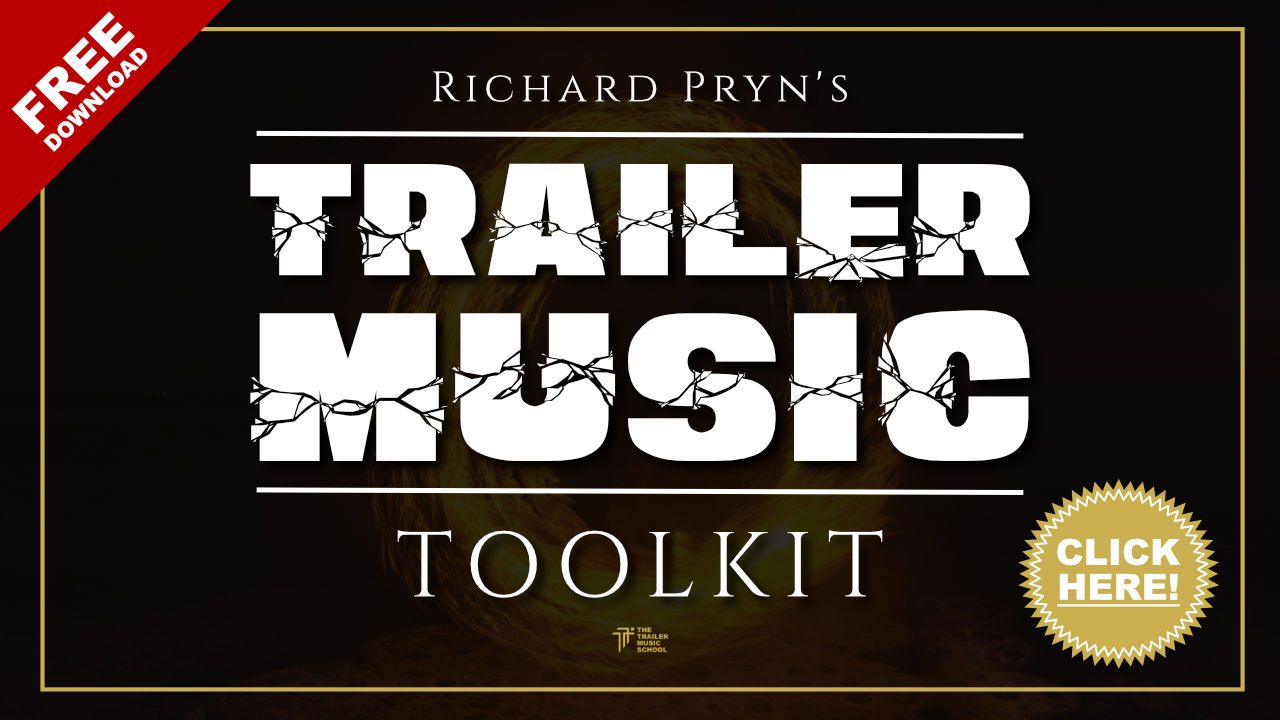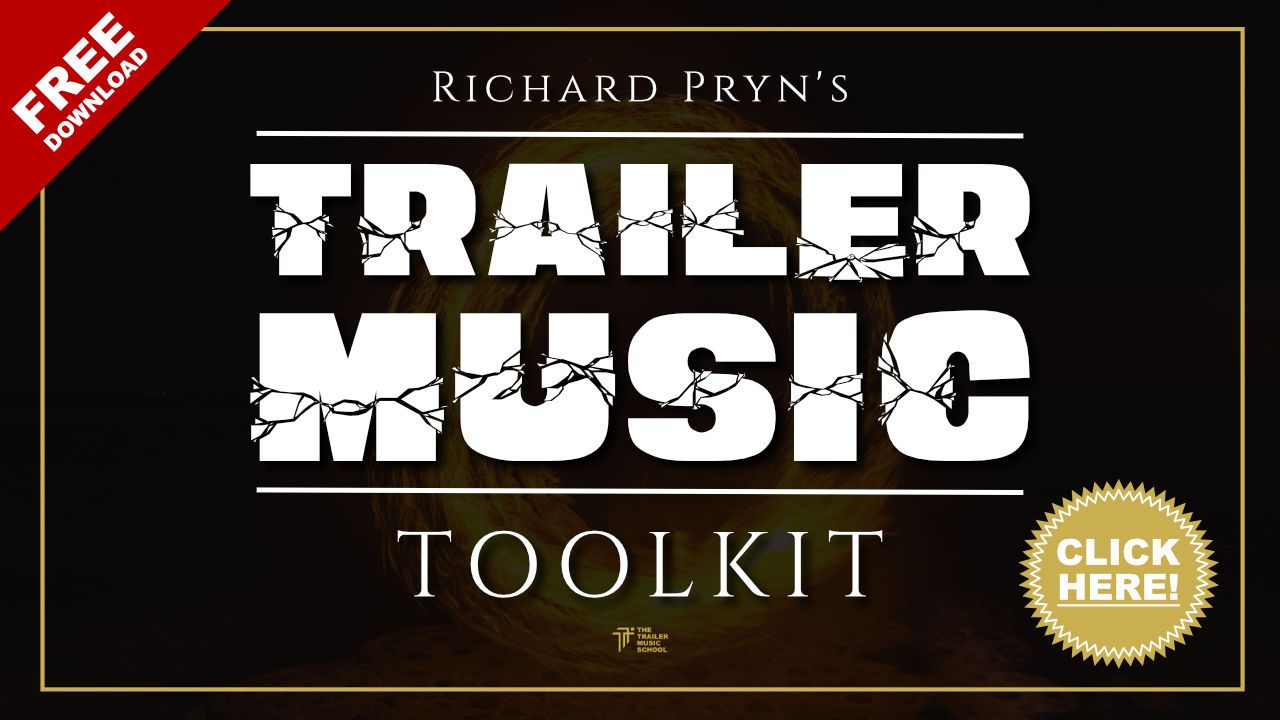The ability to produce high-quality music within a tight deadline is incredibly valuable.
The only issue is that without proper preparation and planning it can cause quite a bit of stress and worry.
Not good.
I want to share with you my secret to producing licensable trailer music quickly and easily, and without all the stress.
Step 1. Be prepared
Preparation is so important when it comes to working quickly. It reduces decision fatigue and means that you spend more time creating and less time 'searching for things'.
Build Your Templates
This is one of the first things I teach in my Trailer Music Course, to build a well-rounded and versatile template for trailer music.
It's such a time-saver in the long run and can really help when you need to export stems for final delivery.
You will find that it also improves your mixing because it forces you to organise your sounds and instruments into similar groups. Helping you to approach channel processing in a more logical way.
Save Your Presets
The one thing that I found about using templates was that I would often find that I needed to load up another sound that wasn't in the template.
This doesn't cause a huge amount of friction but if it happens a lot during a writing session then it can slow your music production down a fair bit.
I started saving presets in Logic Pro X and saving presets in Kontakt. The result was that if I ever needed a sound, I could very quickly navigate to it in the presets menu and load it up with ease.
Take some time to save your own presets and save yourself some time and frustration.
Save Your Favourites
You may need to access sounds, instruments, or one-shots that you cannot easily save as a preset in your DAW.
You then need to mark them as a favourite, whether that is within the application or in your folders.
This way you can navigate to where the sound is and quickly locate a sound you know works.
I do this with drum samples. I will listen to all the samples and colour code them according to whether I like them or not, or if I imagine they will be useful or not.
This has meant I can open up a folder of hundreds of kick samples and see immediately which ones I like.
Huge time saver.
It's about the idea, not the finished product
The purpose of these tips is for you to aim to sketch an idea out in as complete a form as you can in the allocated time.
This means for example that sometimes you use a string sample that isn't quite right for your track but it shows what you were thinking so that when you go back to it you will have a clear understanding of what you intended.
You can then quickly swap out the sound if needs be.
It's about shifting your mindset around writing and producing music.
Step 2. Get into the right mindset
Mindset is not talked about enough in the music industry. It can mean the difference between winning a job and not. I am including talent/ability in that too. No matter how talented you are, without the right mindset you will be greatly limiting yourself.
The issue with discussing mindset is that we are often dealing with cliches that people have heard so much that they have lost their impact.
For example, "You can achieve anything you put your mind to". I totally believe that statement but I have heard it so much that it feels a bit like getting a compliment from your Mum, "yeah yeah I know, thanks Mum".
However, I ask you to start to give your mindset an MOT and to look more closely at these "cliches" I am offering, as they might just hold the secret to your success.
I know that there are three lessons in mindset that sound cliche, but they have had a profound effect on my life and career.

Don't write and edit at the same time
This was an absolute game-changer for me.
Before I started actioning this advice I found myself constantly writing an idea and then deleting it. After a few iterations of this scenario, I found myself demotivated and listless.
The worst part was that I ended up binning great ideas.
What a waste.
Then my wife and I had kids and we decided to share childcare. This meant that I only had small chunks of time to write. I didn't have time to concern myself with editing and minor tweaks.
I had to get my ideas out fast.
As a result, I stopped criticising my work as I was writing and just let the creative process happen.
I let myself compose music unhindered by critical thinking.
All of a sudden my work began to flow more easily and my output increased hugely.
The track you are writing could be paying your mortgage next year
The thing about artistic pursuits is that you have no idea what will come of the work you are producing.
It may end up never being seen or heard again.
OR.
It may end up being picked up for an advertising campaign and pay your mortgage for a whole year.
You need to accept that every track has the potential to change your life. I know this suddenly puts a lot of pressure on your music but it is also extremely exciting.
I hear some of you saying,
"That's ok for you Rich, you work with the "right" people! I don't have any contacts or connections, how is any of my music going to do that!?"
My answer to you naysayers is a story of my first big placement.
When I was a student I was working for free on lots of short films.
One of the film directors I was working with asked me if I could produce a track that sounded like Lost music. At the time I didn't even know Lost was a TV show let alone what the music was.
I said "yes" and created a track as an antidote for 'feeling lost'.
Needless to say, it was nothing like Michael Giacchino's score to Lost.
As you can imagine, the director did not use the track.
I was devastated and yet I did not chuck the track, I kept it and pushed it out there.
Years later, it got picked up by a new contact I had made and landed on a national TV ad for a cheese company.
The fee and royalties paid my mortgage and bills for the whole year.
You are amazing and your gift needs to be shared with the world
It took me many years to acknowledge that sharing my music with the world was not a selfish thing. In fact, it was a gift that needed to be shared.
Other people's music has featured heavily in my life and has served as a tonic when I was down, a community when I was alone, and a friend to share my elation with.
Had those people not shared their music with the world, my life would have been so much duller and lonely.
This applies to you too. You must share the music you create because you will never know what effect it is having on the world and what positive things it is doing.
You are amazing and your gifts must be shared!
Trust in this and share your work.
Step 3. Learn to work with deadlines
Working with deadlines is a wonderful thing.
It is a limitation that not only increases your creativity but also allows you to structure your life and your work more effectively.
The biggest advantage of deadlines is that the limitation on time forces decisions to be made.
Much like when sharing childcare with my wife forced me to use my time better, working with deadlines will force you to get the work done and not waste endless hours "tweaking".
My experience with deadlines was admittedly quite extreme; I would get a music search in the morning and deliver the track in the afternoon.
As my work continued and I began working on albums rather than music searches, the deadlines became the amount of time I allocated to work. They were pretty much self-imposed.
I would usually allocate 2-hour blocks because I could produce something tangible and I would also stop before I got tired and cynical.
You may find that you can work for longer or you may find that you can only work for less.
Find the "deadline" that works for you and fits the life you want to live.
You could start with just 10 minutes.
I am actually a huge advocate for allocating a 10-minute block of time and doing that daily, over time that will compound and your work will progress much faster than you think. I call this the 10-minute method.
The most important part
This all comes down to you and the work you are willing to put in.
Getting your templates, presets, sound libraries etc in order, working on your mindset, and setting your own deadlines.
This all comes down to you in the end so what are you waiting for ;)

Get my FREE Trailer Music Toolkit
It contains all the One-shots you need to sketch a complete track, and the hugely popular Perfect Trailer Music Cue Blueprint PDF.




